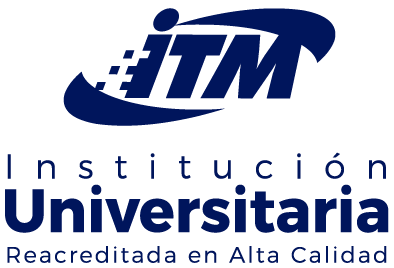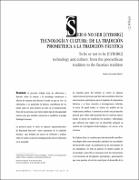Mostrar el registro sencillo del ítem
Ser o no ser [Cyborg] tecnología y cultura: de la tradición prometeica a la tradición fáustica
| dc.contributor.author | Marín, Ramiro Fernando | |
| dc.date.accessioned | 2019-07-16T17:02:25Z | |
| dc.date.accessioned | 2019-08-23T16:27:28Z | |
| dc.date.available | 2019-07-16T17:02:25Z | |
| dc.date.available | 2019-08-23T16:27:28Z | |
| dc.date.issued | 2012-12-18 | |
| dc.identifier | https://revistas.itm.edu.co/index.php/trilogia/article/view/152 | |
| dc.identifier | 10.22430/21457778.152 | |
| dc.identifier.uri | http://hdl.handle.net/20.500.12622/1220 | |
| dc.description.abstract | El presente trabajo trata de reflexionar y discutir cómo la ciencia y la tecnología comienzan a afectar de manera más directa el modo en que se vive. La cibernética y en particular la biónica, contribuyen de un modo cada vez más decisivo no solo en el mejoramiento físico de las personas que tienen algún tipo de discapacidad motora sino que también comienzan a modificar la propia fisiología humana.La primera parte se sitúa en algunas argumentaciones de Raymond Kurzweil –claro exponente de la tradición fáustica– que brindan un marco de reflexión y análisis sobre el modo en que la tecnología puede ejercer influencia en la sociedad.La segunda parte del artículo se centra en algunas experiencias de personas que han sido sometidas a diversas intervenciones quirúrgicas para el implante de dispositivos biónicos, y se hace mención a investigaciones referidas al tema. De igual modo, se realiza un análisis de las implicancias políticas y económicas desde una perspectiva general, pero sobre todo haciendo foco en América Latina, donde se ponen de manifiesto los desafíos y dificultades que enfrenta una región con un desarrollo desigual en materia de investigación biotecnológica y de acceso a los recursos.En el plano ético, se concluye que todo desarrollo científicotecnológico debe estar orientado a satisfacer las necesidades del desarrollo social y la satisfacción de las necesidades de los Ciudadanos. Se trata de generar un debate amplio en la sociedad, y para ello es necesario crear los mecanismos y herramientas de divulgación, aprendizaje y participación que sean puestas al servicio social para el desarrollo de la responsabilidad social. En este sentido, la educación en Ciencia Tecnología y Sociedad persigue precisamente el propósito de cultivar ese sentido de responsabilidad social. (Diago y otros, 2010).Todos estos elementos servirán de input para una reflexión acerca del modo en que estas tecnologías, en las primeras décadas del siglo XXI, pueden influenciar en el modo de vida de los individuos y para pensar en los modos que permitan situar a la tecnología al servicio de la cultura y no al contrario. | spa |
| dc.format.mimetype | application/pdf | |
| dc.language.iso | spa | |
| dc.publisher | Instituto Tecnologico Metropolitano (ITM) | spa |
| dc.relation | https://revistas.itm.edu.co/index.php/trilogia/article/view/152/155 | |
| dc.rights | Derechos de autor 2017 trilogía Ciencia Tecnología Sociedad | spa |
| dc.source | 2145-7778 | |
| dc.source | 2145-4426 | |
| dc.source | Trilogía Ciencia Tecnología Sociedad; Vol 4 No 7 (2012); 33-58 | eng |
| dc.source | Trilogía Ciencia Tecnología Sociedad; Vol. 4 Núm. 7 (2012); 33-58 | spa |
| dc.subject | Sociología de la tecnología | spa |
| dc.subject | cultura tecnológica | spa |
| dc.subject | cultura tecnológica incorporada | spa |
| dc.subject | cultura tecnológica no incorporada | spa |
| dc.title | Ser o no ser [Cyborg] tecnología y cultura: de la tradición prometeica a la tradición fáustica | spa |
| dc.title.alternative | To be or not to be [CYBORG] technology and culture: from the promethean tradition to the faustian tradition | |
| dc.subject.keywords | Sociology of Technology | eng |
| dc.subject.keywords | technological culture | eng |
| dc.subject.keywords | technological culture incorporated | eng |
| dc.subject.keywords | technological culture unincorporated | eng |
| dc.type | info:eu-repo/semantics/article | |
| dc.type | info:eu-repo/semantics/publishedVersion | |
| dc.type | Articles | eng |
| dc.type | Artículos | spa |
| dc.relation.ispartofjournal | Trilogía Ciencia Tecnología Sociedad | |
| dc.description.abstractenglish | This paper tries to reflect and discuss how science and technology begin to more directly affect the way that is lived in the present. Cybernetics and in particular, bionics contribute an ever more crucial not only in the physical improvement of people with motor disabilities but also begin to modify their own human physiology.The first part of this work is on Raymond Kurzweil–clear example of the Faustian tradition– some arguments that give a frame work to examine and discuss how technology can influence society.The second part of the article focuses on some of the experiences of people who have been subjected to various surgical procedures for implanting bionic devices.Similarly, some mention is made investigations concerning the subject. From these facts, the characters express their views on the results and consequences. Similarly, an analysis of the political and economic implications, not only thinking from a general perspective but also, and more specifically, focusing from Latin America.In the latter sense, it underlines the challenges and difficulties faced by a region of uneven development in biotechnology research and access to resources.Moreover, in the ethical, it is concluded that all scientific development must be geared to meet the needs of social development and meeting the needs of citizens. Of what it is to generate a broad discussion in society and it is there for necessary to create mechanisms and reporting tools, learning and participation that are placed in social service for the development of social responsibility. In this sense, education in Science Technology and Society pursues precisely the purpose of cultivating that sense of social responsibility. (Diagoet al, 2010)All these elements, together, as has been said, the analysis of recent research, will serve a sin put for a reflection on how these technologies, in the first decades of the century, can influence the way of life of individuals and to thinking ways that would put the technology in the service of culture.The second part of the article focuses on some of the experiences of people who have been subjected to various surgical procedures for implanting bionic devices. Similarly, some mention is made investigations concerning the subject. From these facts, the characters express their views on the results and consequences. Similarly, an analysis of the political and economic implications, not only thinking from a general perspective but also, and more specifically, focusing from Latin America. In the latter sense, it under lines the challenges and difficulties faced by a region of un even development in biotechnology research and access to resources.Moreover, in the ethical, it is concluded that all scientific development must be geared to meet the needs of social development and meeting the needs of citizens. Of what it is to generatea broad discussion in society and it is there for necessary to create mechanisms and reporting tools, learning and participation that are placedin social service for the development of social responsibility. In this sense, education in Science Technology and Society pursues precisely the purpose of cultivating that sense of social responsibility. (Diagoet al,2010)All these elements, together, as has been said, the analysis of recent research, will serve a sinput for a reflection on how these technologies, in the first decadesof the century,can influence the way of life of individuals and to thinking way sthat would put the technology in the service of culture and not vice versa. | eng |
| dc.rights.accessrights | info:eu-repo/semantics/openAccess | |
| dc.type.coar | http://purl.org/coar/resource_type/c_6501 |
Ficheros en el ítem
Este ítem aparece en la(s) siguiente(s) colección(ones)
-
Vol. 4 Núm. 7 (2012) [12]


